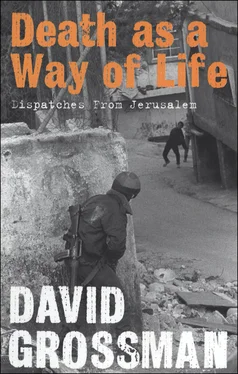David Grossman - Death as a Way of Life
Здесь есть возможность читать онлайн «David Grossman - Death as a Way of Life» весь текст электронной книги совершенно бесплатно (целиком полную версию без сокращений). В некоторых случаях можно слушать аудио, скачать через торрент в формате fb2 и присутствует краткое содержание. Год выпуска: 2013, Издательство: Bloomsbury Publishing, Жанр: Прочая документальная литература, на английском языке. Описание произведения, (предисловие) а так же отзывы посетителей доступны на портале библиотеки ЛибКат.
- Название:Death as a Way of Life
- Автор:
- Издательство:Bloomsbury Publishing
- Жанр:
- Год:2013
- ISBN:нет данных
- Рейтинг книги:5 / 5. Голосов: 1
-
Избранное:Добавить в избранное
- Отзывы:
-
Ваша оценка:
- 100
- 1
- 2
- 3
- 4
- 5
Death as a Way of Life: краткое содержание, описание и аннотация
Предлагаем к чтению аннотацию, описание, краткое содержание или предисловие (зависит от того, что написал сам автор книги «Death as a Way of Life»). Если вы не нашли необходимую информацию о книге — напишите в комментариях, мы постараемся отыскать её.
Death as a Way of Life — читать онлайн бесплатно полную книгу (весь текст) целиком
Ниже представлен текст книги, разбитый по страницам. Система сохранения места последней прочитанной страницы, позволяет с удобством читать онлайн бесплатно книгу «Death as a Way of Life», без необходимости каждый раз заново искать на чём Вы остановились. Поставьте закладку, и сможете в любой момент перейти на страницу, на которой закончили чтение.
Интервал:
Закладка:
Yet each side is certain that the other side has not suffered sufficiently. That being the case, it’s clear that the conflict has yet to exhaust the reservoirs of hatred, and has yet to bring both peoples to the state of exhaustion that will be necessary for them to begin making concessions. Almost the opposite is true — the Palestinians’ bloody terrorist attacks have led to a metamorphosis. The thirty-three years of Israel’s repression in the territories that it conquered in 1967 (a conquest that was instigated, let’s not forget, by the hostile acts of Arab countries against Israel) have nearly been expunged from Israeli consciousness. It’s very convenient for most Israelis to believe that now accounts with the Palestinians have been settled, and the blame for the current situation lies entirely on their shoulders.
And this may well be the root cause of the prevailing despair that any mutual understanding can be achieved. The Palestinians begin their timeline of the conflict from, at the latest, 1948, when the State of Israel was founded. Israelis, for the most part, place the starting point of their timeline at September 2000.
According to this Israeli perception, there is no chance of any compromise now, because “there’s no partner,” because “the Palestinians are all terrorists,” and because “they rejected the generous offer made them by Ehud Barak.” The Palestinians also despair in advance of any compromise. In their perception, any agreement that could be achieved now, in the current international climate, would favor Israel, and would certainly not meet even the minimal requirements of the Palestinian people.
In hindsight, the Palestinians’ strategic choice to use terrorism as their weapon worked like a boomerang. It severely weakened the moral force of the Palestinian struggle and branded Yasir Arafat as a terrorist in the United States and other parts of the Western World. It also provided a not insignificant justification for Israel’s harsh and massive military response. Now, nearly every Palestinian action, even if it is justified resistance to the occupation, is perceived by policymakers in the West as terrorism. To a large extent, this paralyzes the Palestinian cause.
There’s an astonishing paradox on the Israeli side. Israel is worse off than it has ever been in the last thirty-five years. Its security, economy, and national morale are in decline. Yet Ariel Sharon, its failure of a prime minister, remains the most popular man in the country. There’s a simple explanation. Sharon has succeeded, with no little help from Palestinian terrorism, in getting the Israeli people to restrict their view of their complex conflict with the Palestinians to a single question. Israelis now think solely of their personal security. It’s certainly an issue of decisive importance, especially in the current state of affairs. Yet Sharon’s political cunning is such that he has succeeded in reducing it to a single dimension, so that the only answer to the great and complicated question “How does Israel make itself secure?” is “By force.”
This is Sharon’s expertise. Force, more force, and only force. The result is that any time some small flicker of a chance appears, every time there is a decline in violence, Sharon rushes to carry out another “targeted liquidation” of one or another Palestinian commander, and the fire flares again. Any time Palestinian representatives declare their willingness to renew negotiations and halt violence and suicide attacks, the response from Sharon’s office is dismissal and derision. As far as the current Israeli government is concerned, even if the current Palestinian leadership were to swear fealty to Sharon’s Likud Party, the act would be labeled a sinister gambit aimed at gaining legitimacy for the armed struggle against Israel.
Sharon has loyal allies — the extremists among the Palestinians, who are also quick to incite the mob and send endless suicide bombers to Israel’s cities each time there seems to be a respite. Each side is thus playing on the fears and despair of the other, each chasing the other around the familiar vicious circle — the more violence increases, the less chance there is of persuading people on either side that there is any possibility of a compromise, pushing the violence up to even higher levels. Day by day the temptation grows to view the opponent as other than human, making any action against him permissible. But those who permit themselves to do anything to their enemies are, for all intents and purposes, declaring that they, too, are inhuman, thus inviting a similar kind of vengeance from their opponents.
So two years have passed. Who has won and who has lost, as of now?
On the surface — and this is true only for this given moment — Israel has undoubtedly won. Arafat is losing his international legitimacy. Until just a few days ago, he was losing his hold over his own people as well, as they became ever more aware of his corruption and his failure as a leader. He is now trapped and isolated in the three or four rooms that remain in his headquarters in Ramallah. The senior command level of most of the Palestinian organizations has been killed or captured by Israeli security forces. The people on the second and third command levels are inexperienced in combat, in organizational skills, and in field security. The result is that Israel has been hugely successful in preventing most of the terrorist attacks that the Palestinians have tried to commit.
At the beginning of the Intifada, and especially when suicide attacks increased in frequency, it seemed to the Palestinians that Israeli society was weak. They believed, as one Palestinian leader put it, that Israel was no stronger than a spiderweb. Today it is clear that the severity of the attacks and the large number of victims they have claimed have reinforced Israel’s sense of national unity and common identity. Israelis today are willing to suffer heavy losses to achieve Sharon’s goals.
Yet Israel is paying a high price. Two years into the Intifada, Israel is more militant, nationalist, and racist than it has ever been before. The very broad national consensus has placed all criticism and minority opinions outside the bounds of legitimacy. There is almost no significant opposition. The Labor Party, the shaper of Israel’s national ethos in the country’s first decades, has been digested entirely in the bowels of the right-wing government. Anyone who opposes the brutality of the Sharon government’s actions is suspected of disloyalty bordering on treason. The media has, for the most part, aligned itself with the right, with the government, and with the army, and serves as a clarion for the most hawkish and anti-Palestinian line. Sanctimonious self-righteousness, disdain for the “spineless values” of democracy, calls for the expulsion of Israel’s Arab citizens (in addition to the Palestinians in the territories) have become an accepted and legitimate part of the public discourse that no one gets exercised about.
The power of the extremist religious parties is increasing. A wave of crude and sentimental patriotism is sweeping the country. It wells up out of the authentic, historic, and almost primal sensibilities of “Jewish destiny” in its most tragic form. The Israelis, citizens of the strongest military power in the region, are once again, with strange enthusiasm, walling themselves up behind their sense of persecution and victimization. The Palestinian threat — ridiculous in terms of the balance of power but effective in its results — has forced Israel to return, with depressing speed, to the experience of living in fear of total annihilation. This fear, naturally, justifies a brutal response to any threat.
Israel has won, for now, but what is the meaning of victory when it brings no hope for a better future, not even a sense of security and relief? The Palestinians have lost for the moment, but they are now fighting with their backs to the wall, and it is hard to believe that they will surrender and accept Sharon’s diktats. It may turn out that, as with the first Intifada, the Palestinians have no stamina for a struggle of more than two years and that, as they did then, they face a period of social disintegration and bitter internal struggle. It would behoove Israel not to rejoice should that happen, because in the end Israel has, or at least should have, an interest in a strong and resilient Palestinian society led by a leadership with a broad base of support. Only such a Palestinian society can sign a stable peace agreement with Israel that will include historic concessions. But such a sophisticated argument cannot today penetrate the dullness of the Israeli spirit and mind. And since Israel is stronger than the Palestinians, the conflict is, seemingly, doomed to continue as is for an unpredictable length of time.
Читать дальшеИнтервал:
Закладка:
Похожие книги на «Death as a Way of Life»
Представляем Вашему вниманию похожие книги на «Death as a Way of Life» списком для выбора. Мы отобрали схожую по названию и смыслу литературу в надежде предоставить читателям больше вариантов отыскать новые, интересные, ещё непрочитанные произведения.
Обсуждение, отзывы о книге «Death as a Way of Life» и просто собственные мнения читателей. Оставьте ваши комментарии, напишите, что Вы думаете о произведении, его смысле или главных героях. Укажите что конкретно понравилось, а что нет, и почему Вы так считаете.












